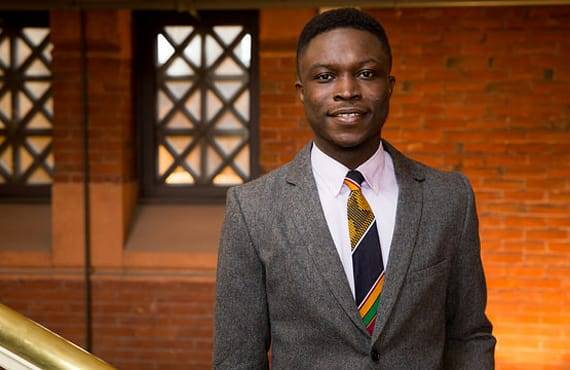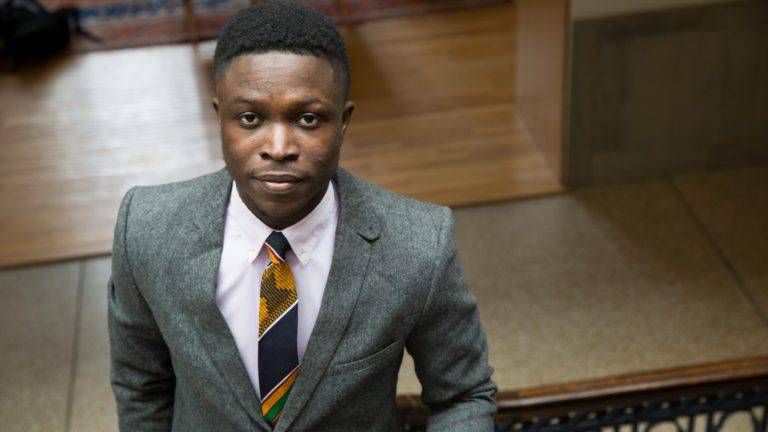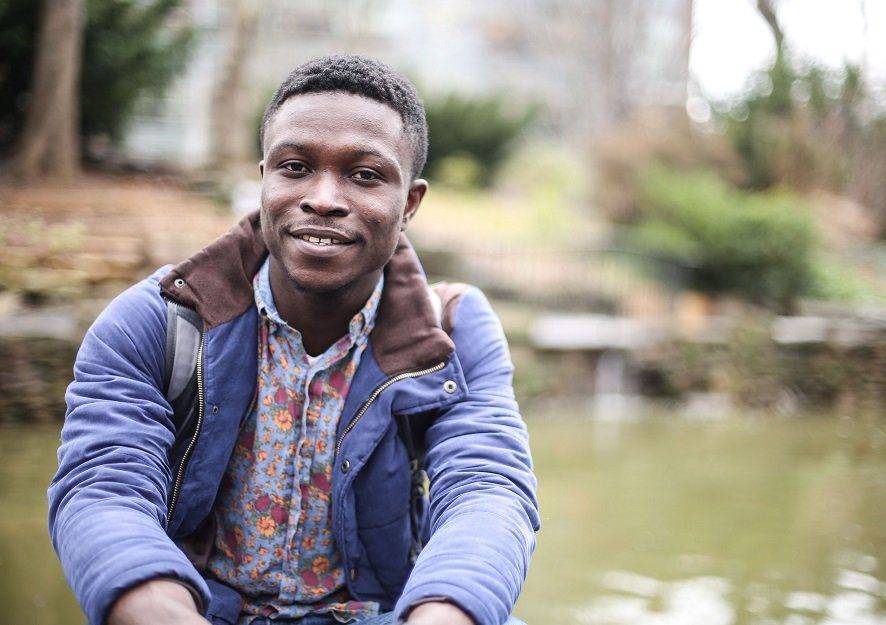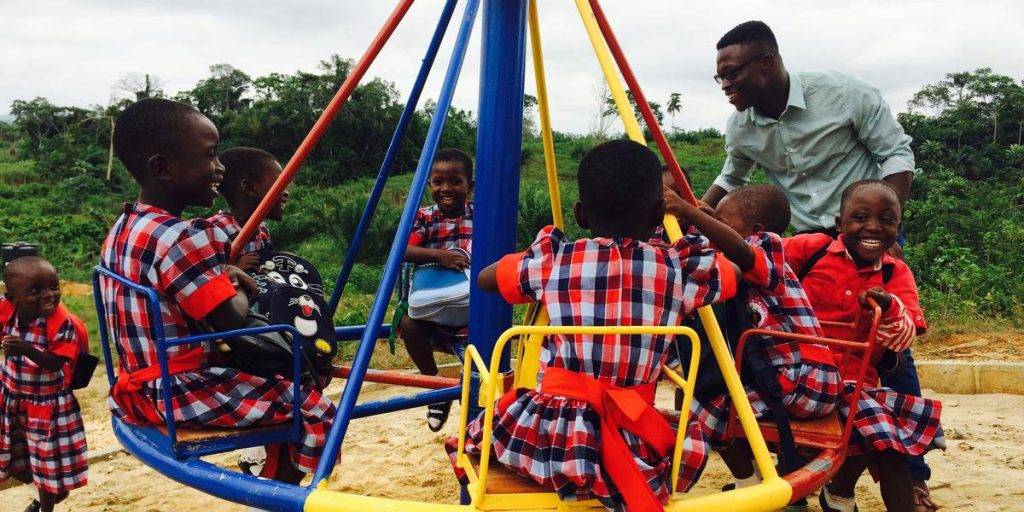Cocoa Is Being Used To Send Kids To School – And This Ghanaian Entrepreneur Is The Brain Behind It

Ghana’s cocoa economy is believed to be worth approximately USD 2 Bn and Tarkwa Breman – a remote village in the country’s western region – is known to weigh in with a sizeable chunk of the produce propping up that figure.
You’d think for being such a key element of Ghana’s agro-economy, such an area will be the hub of strategic and immense developmental efforts on the part of the government. But in truth, the reality is, in fact, on the contrary.
Tarkwa Breman is one of many Ghanaian rural communities where produce is put on the front burner, whereas, the welfare of the individuals churning out the ‘produce’ takes the backseat. In many such places, most of the inhabitants are small-time farmers who toil for less than a dollar a day and are helplessly trapped in intergenerational poverty.
In Tarkwa Breman, for instance, there is a dearth of basic social amenities like electricity, pipe-borne water, healthcare facilities, and access roads. It’s kind of a paradox – the locals live in the midst of privations, earning meagre sums for their efforts in spite of their significant contributions to Ghana’s cocoa economy.

Source: sp2.upenn.edu
Shadrack Frimpong was born and raised in Tarkwa Breman and like many others, he was no stranger to the poor living standards that characterised the community. His parents were part of the roughly 1.6 million cocoa farmers driving Ghana’s billion-dollar cocoa economy and yet, there was very little or nothing to show for it.
But even from a very young age, Frimpong was determined to change the narrative. Although many before him had surrendered to the status quo and continued the cycle of poverty, he had made up his mind to effect change, even though he might have to do it all by himself.
The Ghanaian visionary always thought it an injustice that his people worked so hard for so little. It was his reckoning that if the community’s main produce, cocoa, was that valuable, it was only fair that the community developed itself by making the most of it.
And it does look like the young Ghanaian entrepreneur is making some headway on that front with a project dubbed Cocoa360. Through the intiative, natives of Tarkwa Breman are not only contributing to the agricultural growth of the continent. They have also become torchbearers of sustainable development at the grassroots.
And they are achieving this by using revenues from collectively-owned and community-run cocoa farms to facilitate the provision of basic social amenities in remote villages where these farms are set up.
Being that Frimpong was born into a family that was struggling to make ends meet and having grown up in a community that was essentially cut off from any form of development, it seemed very unlikely that the young lad would get anywhere close to having dreams, let alone living them.
At some point, his education was in jeopardy as his folks could not afford to send him to high school without basically cutting themselves open. And that was to bring the first glimpses of his resourcefulness to the fore.
Between street hawking to help with the upkeep of the family and working tirelessly to qualify for a scholarship from the Ghana Cocoa Board, Frimpong clawed his way through and earned a place at Opoku Ware School, in Kumasi.

There his stock continued to rise as he continued to be prolific in his academics. And it was quite fitting that the crowning moment came at the tail-end of his stint in high school when he secured a full scholarship to study at the University of Pennsylvania, U.S.A.
By achieving that feat, he essentially became the toast of all and sundry – especially as he also became the first person in his community to attend college in the United States.
Frimpong basked in the euphoria of the achievement only momentarily as he knew better than to let it get to his head or become complacent being that a lot more was yet undone. He considered his trip to college a rare privilege – one he intended to make the most of.
So, he dug in even deeper once he arrived there. All that time, he was conscious of the state of things back home. The idea was to be better so he could be in a position to make things better. And by the time he returned home with a degree in Biology, his academic prowess had earned him numerous honours and awards, including the Amy Gutmann President’s Engagement Prize (PEP) worth USD 150 K.

That cash award served as seed funding with which he set up the non-profit organisation, Cocoa360, upon his return in 2015. The organisation runs a community health clinic and a tuition-free school for girls in eight communities; blazing a trail with its “farm-for-impact” model which uses proceeds from a community cocoa plantation to self-sustain the hospital and school.
To date, the Cocoa360 initiative claims to have sent 126 students to various schools, while its community health centre has attended to around 3,000 patients and overseen the successful delivery of up to 40 newborns.
Being a community-based and community-driven initiative, the Cocoa360 project works with a village committee which serves as an interface between the organisation and the community to make certain that the programmes adopted have the interests of the community at heart at all times.
Cocoa360 works with a pretty simple and straightforward model. It connects with cocoa-producing communities and identifies areas of greatest need. Then, it manages the proceeds from the cocoa produced in these communties and puts it to use in improving the education and healthcare outcomes.
Essentially, it’s about pulling resources together (both labour and land) at the community level to produce large quantities of cocoa for sale, wherein, the proceeds are used to set up and manage schools and healthcare centres, or disbursed in any other way the community sees fit.

“We can’t solve all the problems and that’s why we are just focused on education and healthcare. Our central mission has been how best we can put community members and people that are supposed to benefit from these interventions at the heart of decision-making towards community development,” he reiterates.
With some 37 members of staff, Cocoa360 currently boasts offices in Ghana, London, and the United States. While the office in Ghana is mainly for operations, both the other offices are for fundraising – and that’s according to Frimpong.
Through the initiative, the social entrepreneur is hoping to put the locals at the forefront of the decision-making process as it concerns how the proceeds from their collective effort are spent – giving them the power to develop their communities with the work of their own hands.
Featured Image Courtesy: face2faceafrica.com